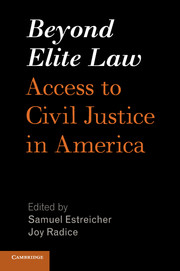Book contents
- Frontmatter
- Contents
- Beyond Elite Law
- Foreword
- List of Contributors
- Overview
- Overview
- PART I CURRENT STATE OF ACCESS TO LEGAL SERVICES
- PART II SOURCES OF LEGAL SERVICES ASSISTANCE FOR WORKING AMERICANS
- PART III FASHIONING A REFORM AGENDA
- 23 New York State Task Force to Expand Access to Civil Legal Services
- 24 New York's 50-hour Pro Bono Requirement
- 25 Starting a “Low Bono” Law Practice
- 26 Toward a More Effective and Accessible Solo and Small Firm Practice Model
- 27 Facilitating Homemade Wills
- 28 Court Facilitation of Self-Representation
- 29 Limited Representation and Ethical Challenges
- 30 Technology Can Solve Much of America's Access to Justice Problem, If We Let It
- 31 Mediation of Employment Disputes at the EEOC
- 32 AAA Consumer Arbitration
- 33 Saturns for Rickshaws: Lessons for Consumer Arbitration and Access to Justice
- 34 Employment Arbitration in the Securities Industry
- 35 FINRA Arbitration and Employment Disputes
- 36 Arbitration as an Employee-Friendly Forum
- 37 Access to Justice in Employment Arbitration: a Critical Look
- 38 Collaborative Technology Improves Access to Justice
- 39 Union Representation in Employment Arbitration
- 40 Legal Representation for New York City's Chinese Immigrant Workers
- 41 Reassessing Unauthorized Practice of Law Rules
- 42 The Pyett Protocol: Collectively-Bargained Grievance Arbitration as a Forum for Individual Statutory Employment Claims
- PART IV CREATING A CULTURE OF SERVICE
- Index
24 - New York's 50-hour Pro Bono Requirement
from PART III - FASHIONING A REFORM AGENDA
Published online by Cambridge University Press: 05 May 2016
- Frontmatter
- Contents
- Beyond Elite Law
- Foreword
- List of Contributors
- Overview
- Overview
- PART I CURRENT STATE OF ACCESS TO LEGAL SERVICES
- PART II SOURCES OF LEGAL SERVICES ASSISTANCE FOR WORKING AMERICANS
- PART III FASHIONING A REFORM AGENDA
- 23 New York State Task Force to Expand Access to Civil Legal Services
- 24 New York's 50-hour Pro Bono Requirement
- 25 Starting a “Low Bono” Law Practice
- 26 Toward a More Effective and Accessible Solo and Small Firm Practice Model
- 27 Facilitating Homemade Wills
- 28 Court Facilitation of Self-Representation
- 29 Limited Representation and Ethical Challenges
- 30 Technology Can Solve Much of America's Access to Justice Problem, If We Let It
- 31 Mediation of Employment Disputes at the EEOC
- 32 AAA Consumer Arbitration
- 33 Saturns for Rickshaws: Lessons for Consumer Arbitration and Access to Justice
- 34 Employment Arbitration in the Securities Industry
- 35 FINRA Arbitration and Employment Disputes
- 36 Arbitration as an Employee-Friendly Forum
- 37 Access to Justice in Employment Arbitration: a Critical Look
- 38 Collaborative Technology Improves Access to Justice
- 39 Union Representation in Employment Arbitration
- 40 Legal Representation for New York City's Chinese Immigrant Workers
- 41 Reassessing Unauthorized Practice of Law Rules
- 42 The Pyett Protocol: Collectively-Bargained Grievance Arbitration as a Forum for Individual Statutory Employment Claims
- PART IV CREATING A CULTURE OF SERVICE
- Index
Summary
Engaging law students in pro bono work before graduation can instill in them a professional ethic of volunteer work that they carry throughout their careers. Victoria Graffeo, former New York State Court of Appeals judge, describes New York's mandatory 50-hour pro bono rule, the first of its kind, which requires all applicants to the New York bar who sit for the bar examination to complete 50 hours of qualifying pro bono work. Because the rule does not set any income requirements for pro bono clients, it has the potential to help middle-class as well as poor Americans meet their legal needs.
On Law Day in 2012, Chief Judge Lippman announced several new initiatives directed at easing the crisis in civil legal services. One proposal – the first of its kind in the nation – was directed at law students. Judge Lippman explained:
If pro bono is a core value of our profession, and it is – and if we aspire for all practicing attorneys to devote a meaningful portion of their time to public service, and they should – these ideals ought to be instilled from the start, when one first aspires to be a member of the profession. The hands-on experience of helping others by using our skills as lawyers could not be more of a pre-requisite to meaningful membership in the bar of our state.
Chief Judge Lippman recognized that the pool of law students preparing for the legal profession represented a valuable and untapped resource. To be admitted to the New York bar, applicants will be required to perform 50 hours of pro bono work. This chapter describes the evolution of the 50-hour pro bono requirement and how it will be administered in the hope that it can serve as a model for other states addressing similar gaps in access to civil justice.
SETTING UP AN ADVISORY COMMITTEE
Chief Judge Lippman appointed 15 members representative of the profession to serve on the Advisory Committee and develop the 50-hour requirement. Members included law school faculty, current and former state and federal judges, legal services providers, current and former bar leaders, and practitioners from law firms with well-established pro bono programs. I co-chaired the committee with Alan Levine, former chair of the Board for New York's Legal Aid Society.
- Type
- Chapter
- Information
- Beyond Elite LawAccess to Civil Justice in America, pp. 359 - 366Publisher: Cambridge University PressPrint publication year: 2016



